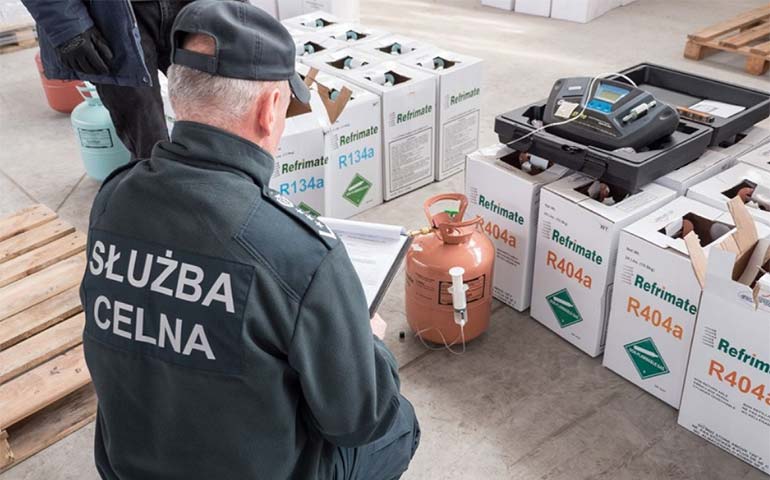Illegal HFC still entering the EU
15th April 2020
BELGIUM: Corporate investigators insist that HFC refrigerants are still entering the EU illegally, despite improvement in enforcement activities.
Kroll, a New-York-based firm of corporate investigators employed by the refrigerant manufacturers’ group EFCTC, has found evidence of large quantities of illegal imports of HFCs, equivalent to as much as 4.7MtCO2e.
Kroll’s investigations have identified various means in which the illegal gases are entering the EU, shedding light on the enormity of the problem. A total of 444 takedown requests were made to 15 market platforms, such as eBay, OLX, and MarktPlaats. Most related to refrigerant in illegal disposable cylinders.
Through an investigative study, commissioned by the EFCTC, Kroll has followed up on 228 reports of illegal activity submitted to its confidential Action Line between March and December 2019. Hundreds of shipments, many from China, were identified.

Complex shipping routes and reseller markets complicate the issue – an HFC cylinder can, for example, be sold through one, two or more intermediaries before it is imported across an EU border. As a result, the EFCTC maintains that forensic investigative work is key to addressing the issue.
The first investigation has so far identified five main ways in which illicit trade in HFCs is taking place: misdirected trans-shipments (products declared to be transhipped across the EU ultimately placed on the market in the EU without quota); quota abuse by incumbents and new entrants (importer has insufficient quota to cover their imports) and quota pooling (creating a network of self-owned new entrants); open smuggling (goods declared to customs but importer has no quota); low-level cross-border smuggling; and counterfeit and banned products (mainly R1234yf and R22).
This intelligence was shared with enforcement agencies in a dozen member states, resulting in increased enforcement activity, evident in recent seizures in Bulgaria and Italy.
Combined, Kroll has been able to build evidence of a total of at least 3,000 tonnes of HFCs.
“The latest findings from Kroll reveal the complexity of the problem. The numerous ways HFCs are crossing European borders is truly concerning and shows this problem requires a concerted approach,” said Mark Vergnano, president and CEO of EFCTC member Chemours.
Large-scale illegal imports not only hamper the EU’s climate goals, but also fund other illegal activities and reduces national tax revenue from legal alternatives.
“However, the new findings do show that efforts to stop illegal imports are starting to have an impact,” said Mark Vergnano. “The 228 reports on the Action Line from across Europe have enabled us to track where some of the shipments are coming from, where they are going, and how they’re transported.”
Italy and Poland lead the way with 42 and 34 reports, respectively, to the Action Line. Germany was close behind with 22.
Related stories:
EFCTC introduces illegal refrigerant reporting “hotline” – 19 March 2019
EUROPE: Illegal refrigerant imports and sales activity in Europe can now be easily reported, and in confidence, through a new website established by the refrigerant producers group EFCTC. Read more…







